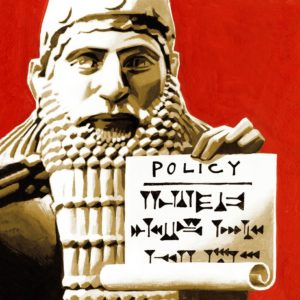Insurance policies go back to the ancient Babylonians and were crucial in the early development of capitalism
The Wall Street Journal, February 21, 2019

ILLUSTRATION: THOMAS FUCHS
Living in a world without insurance, free from all those claim forms and high deductibles, might sound like a little bit of paradise. But the only thing worse than dealing with the insurance industry is trying to conduct business without it. In fact, the basic principle of insurance—pooling risk in order to minimize liability from unforeseen dangers—is one of the things that made modern capitalism possible.
The first merchants to tackle the problem of risk management in a systematic way were the Babylonians. The 18th-century B.C. Code of Hammurabi shows that they used a primitive form of insurance known as “bottomry.” According to the Code, merchants who took high-interest loans tied to shipments of goods could have the loans forgiven if the ship was lost. The practice benefited both traders and their creditors, who charged a premium of up to 30% on such loans.
The Athenians, realizing that bottomry was a far better hedge against disaster than relying on the Oracle of Delphi, subsequently developed the idea into a maritime insurance system. They had professional loan syndicates, official inspections of ships and cargoes, and legal sanctions against code violators.
With the first insurance schemes, however, came the first insurance fraud. One of the oldest known cases comes from Athens in the 3rd century B.C. Two men named Hegestratos and Xenothemis obtained bottomry insurance for a shipment of corn from Syracuse to Athens. Halfway through the journey they attempted to sink the ship, only to have their plan foiled by an alert passenger. Hegestratos jumped (or was thrown) from the ship and drowned. Xenothemis was taken to Athens to meet his punishment.
In Christian Europe, insurance was widely frowned upon as a form of gambling—betting against God. Even after Pope Gregory IX decreed in the 13th century that the premiums charged on bottomry loans were not usury, because of the risk involved, the industry rarely expanded. Innovations came mainly in response to catastrophes: The Great Fire of London in 1666 led to the growth of fire insurance, while the Lisbon earthquake of 1755 did the same for life insurance.
It took the Enlightenment to bring widespread changes in the way Europeans thought about insurance. Probability became subject to numbers and statistics rather than hope and prayer. In addition to his contributions to mathematics, astronomy and physics, Edmond Halley (1656-1742), of Halley’s comet fame, developed the foundations of actuarial science—the mathematical measurement of risk. This helped to create a level playing field for sellers and buyers of insurance. By the end of the 18th century, those who abjured insurance were regarded as stupid rather than pious. Adam Smith declared that to do business without it “was a presumptuous contempt of the risk.”
But insurance only works if it can be trusted in a crisis. For the modern American insurance industry, the deadly San Francisco earthquake of 1906 was a day of reckoning. The devastation resulted in insured losses of $235 million—equivalent to $6.3 billion today. Many American insurers balked, but in Britain, Lloyd’s of London announced that every one of its customers would have their claims paid in full within 30 days. This prompt action saved lives and ensured that business would be able to go on.
And that’s why we pay our premiums: You can’t predict tomorrow, but you can plan for it.






